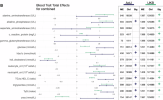Saz94
Senior Member (Voting Rights)
Interview with Chris Ponting by David Tuller about this study from Nov 19, 2024:
I watched the video, and a couple of points stood out to me:
1) he says that they didn’t get blood samples from severe patients for this study, only mild and moderate, and some of the people in the ME patient group even described themselves as being in good health.
2) he says that because it’s blood, not genetics, they can’t know the causational direction - are these abnormalities what’s causing ME, or are they a downstream effect of ME.

